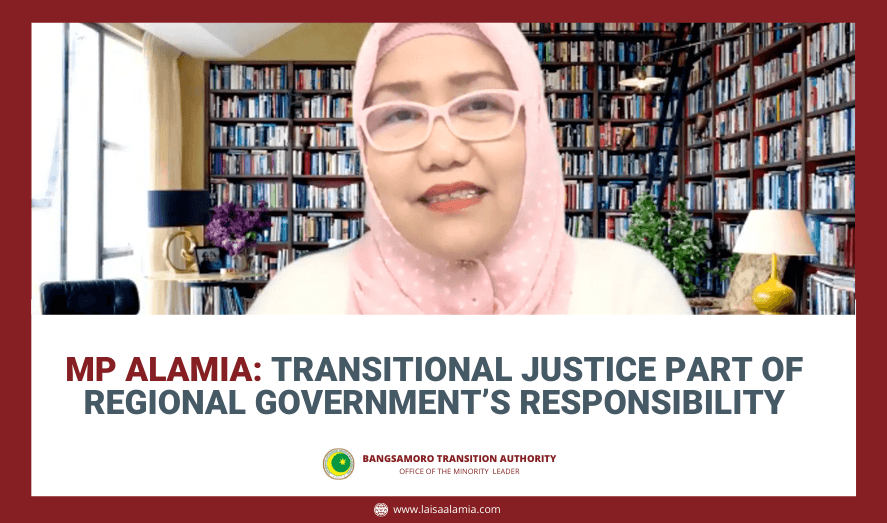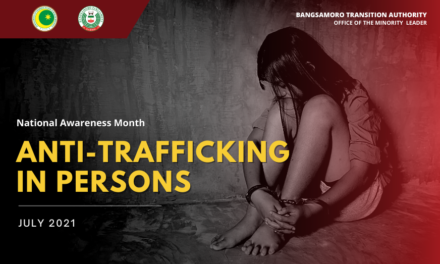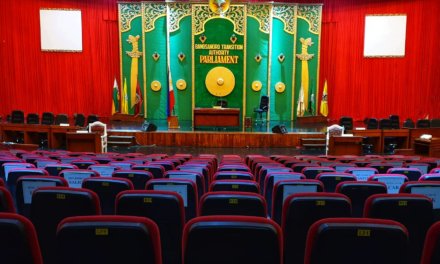Minority Floor Leader MP Atty. Laisa Alamia was a panel speaker and reactor to a public presentation of community narratives and initial proposals on Transitional Justice and Reconciliation (TJR) from civil society that were outlined in the study entitled “Role of Community, Culture, and Memory.” on May 31. With her in the event were Office of the Presidential Adviser on the Peace Process (OPAPP) Assistant Secretary Wilben M. Mayor and Transitional Justice and Reconciliation Commission (TJRC) Chair Mo Bleeker, among other key opinion leaders on transitional justice in the Bangsamoro context.
The said webinar was organized by the Initiatives for International Dialogue (IID) together with its allied peace partners as part of its online information campaign on TJR dubbed as “Usapang Bangsamoro sa Panahon ng Transisyon at Pandemya.” It is the first of five-part series that hopes to provide the public with relevant data on TJR so that they can make informed decisions through awareness building and knowledge-sharing strategies. This webinar is organized with support from the Open Society Foundations (OSF).
“One of the anchors of the study is the recognition that we are in the middle of a ‘post-conflict era’ in the BARMM,” MP Alamia said, and that “we tend to forget to position the current political transition within a broad peacebuilding exercise that is required by the region.” She noted the need to remember “our journey to peace did not end in the establishment of a new regional regime, or even the ceasefire between the state forces and our revolutionary groups.”
“Our journey covers a whole lot more,” she emphasized.
Specialized solutions for existing challenges
“We need to acknowledge that there seems to be a feeling of neglect and exclusion among certain groups and sectors,” MP Alamia said. “Decommissioned combatants, for example, are still waiting on reintegration support that the government has promised.”
She also notes “a higher sense of ownership” of the peace process among the Moros, while some non-Moro indiginous peoples may not share the same level of ownership. A re-emergence of violent extremism is also a concern, as incidents involving IS-affiliated groups continue to occur, as displacement and chronic poverty persist in the region.
“These challenges need specialized solutions, Alamia said, and the study confirms that “we need ways to move forward to ensure we are effecting a broader level of change and sustaining peace in ways that tackle the root cause or key drivers of conflict, ultimately preventing any relapse into conflict.”
The need for transitional justice
MP Alamia emphasized the importance of instituting transitional justice for the Bangsamoro “to lead the people to healing and reconciliation,” and the period of transition is a critical time to start building on the gains of the GPH-MILF process, as parties commit to post-conflict peacebuilding.
“This requires a multi-stakeholder collaboration and a strong sense of ownership among the people of the Bansgamoro,” she said. While it’s important that the TJR agenda is being pushed at the national level, it also needs to be advocated for at the regional level. As leaders, the BARMM regional government has “a moral and legal responsibility” to make sure that efforts for transitional justice and reconciliation (TJR) in the region are initiated and sustained.
Proposed legislation
MP Alamia has been a consistent and active supporter of pending legislation establishing a TJR program and commission for the Bansgamoro, one at the national level and a parallel program at the regional level. At the regional level, the BARMM has two functioning agencies leading the TJR efforts in the interim while a national TJR commission (TJRC) is yet to be established, namely the Bangsamoro Human Rights Commission (BHRC) and the Ministry of Public Order and Safety (MPOS). Both are mandated to pursue human rights and peace program initiatives including TJR, while waiting for further developments at the national level.
However, MP Alamia notes that “we don’t need to wait for a TJRC or board to be set up at the national level,” because “we can look at recommendations and come up with policies to fill in current gaps.”
She said that the Office of the Minority Floor Leader, for one, has taken steps to introduce TJR by linking it with social protection, specifically by “building on the local capacities of our communities in responding to the immediate needs of affected communities through specialized health and social services to war survivors, comprehensive support programs for widows and orphans of war, acknowledgement and protection of rights of the IDPs and boosting regional economy to increase employment opportunities for ex-combatants, among others.”
MP Alamia also mentioned TJR-related legislation that she has been working on, namely the Rights of Internally Displaced Persons in the BARMM or the IDP Rights Bill which she filed in 2019; a bill that highlights the importance of recognition and documentation of human rights violations, which involves tasks that the BHRC can take on until the bill is passed; a bill that provides pensions for former combatants and veterans of war and conflict; and a bill that outlines a reintegration support and benefits Scheme for war survivors and conflict-affected communities, apart from health card program for former combatants and indigents.
She said that these bills are “either pending in parliament or will be filed when the plenary starts,” and their immediate passage would mean that “the regional government is taking responsibility in ensuring that the root causes of the conflict will be responded to.”
“It’s very important we take this responsibility and not just rely on the national government because we are now part of the government,” she said.








